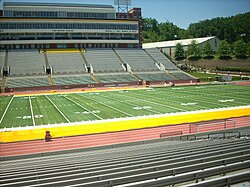Kidd Brewer Stadium
| "The Rock" | |
 The stadium in 2011 The stadium in 2011 |
|
| Former names | Conrad Stadium |
|---|---|
| Location | 270 Stadium Dr Boone, North Carolina 28608 |
| Coordinates | 36°12′42″N 81°41′08″W / 36.21167°N 81.68556°WCoordinates: 36°12′42″N 81°41′08″W / 36.21167°N 81.68556°W |
| Public transit | AppalCart |
| Owner | Appalachian State University |
| Operator | Appalachian State University |
| Executive suites | 18 |
| Capacity | 24,050 (2012-present) 23,150 (2011) 21,650 (2009–2010) 20,150 (2008) 16,650 (1995–2007) 18,000 (1979–1994) 10,000 (1962–1978) |
| Record attendance | 34,658 |
| Surface |
FieldTurf 2003 to present Astroturf 1970 to 2002 Grass 1962 to 1969 |
| Construction | |
| Broke ground | 1960 |
| Opened | September 15, 1962 |
| Renovated | 1999, 2001, 2003, 2008, 2011, 2013, 2016, 2017 |
| Expanded | 1978, 1995, 2008, 2009, 2011-12, 2016 |
| Construction cost | $32 million (2008 expansion) |
| Architect | Walter Robbs Callahan and Pierce (expansions) |
| Tenants | |
|
Appalachian State Mountaineers (NCAA) Football (1962–present) Outdoor Track and Field (1962–present) Field Hockey (1968–2014) |
|
Kidd Brewer Stadium is a 24,050-seat multi-purpose stadium located in Boone, North Carolina. Nicknamed "The Rock", the stadium is the home of the Appalachian State Mountaineers football team. It is also the home of the school's field hockey and track and field teams. Kidd Brewer stands 3,280 feet (1,000 m) above sea level. The stadium also claims to be one of the toughest venues in the nation for a visiting team, with the Mountaineers boasting a 225–72–5 (.753) home record.
Officially opened on September 15, 1962, as Conrad Stadium, in honor of former university trustee and R.J. Reynolds executive William J. Conrad, the stadium was originally constructed with 10,000 permanent seats. It became the first venue in either North or South Carolina to install artificial turf. The Mountaineers and Elon staged the first game on artificial turf in the Carolinas on October 3, 1970. Seating capacity was expanded to 18,000 following the 1978 season. The stadium was the backdrop for the second college football game ever televised by ESPN as the Mountaineers played the Western Carolina Catamounts for the Old Mountain Jug in 1979.
Conrad Stadium was renamed on September 3, 1988 in honor of Kidd Brewer, one of the most successful head coaches in Appalachian football history and a colorful part of North Carolina history. Brewer, a Winston-Salem native, served as head football coach of the Mountaineers from 1935 to 1938, compiling a 30–5–3 overall mark in his four seasons at the helm of the Apps. An All-American at Duke, Brewer's 1937 squad was unbeaten and unscored upon in the regular season. Completion of an extensive renovation and restoration project on the original 10,000 seats in 1995 readjusted the seating capacity to 16,650. A then-state-of-the-art "AppVision" video board was added in 1999 and enlarged prior to the 2001 campaign. Appalachian State was also one of the initial collegiate programs in the country to install FieldTurf at its football stadium in 2003. Appalachian carried a 30-game winning streak, the longest in Division I at the time, before losing to the Georgia Southern Eagles on October 20, 2007. Prior to that game, the Mountaineers' last home loss was in the first round of the playoffs, 13–14, to Maine on November 30, 2002.
...
Wikipedia
